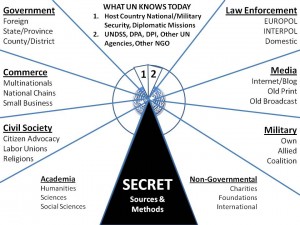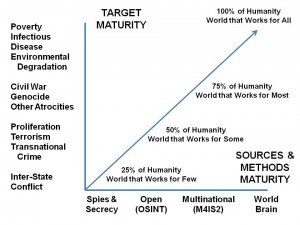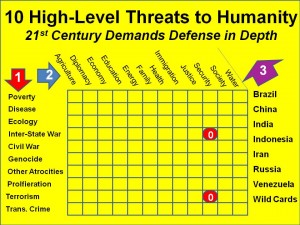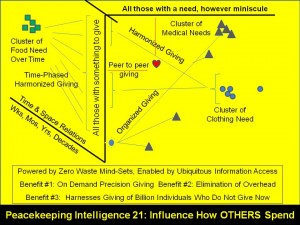UPDATED 2014-01-29 to add the following new links:
2012 Robert Steele: Practical Reflections on UN Intelligence + UN RECAP
References: NATO Transformation Process Documents — and Gaps + Peace from Above RECAP
Search: phd topics on the role of intelligence in peace support operation + Peacekeeping RECAP
United Nations @ Phi Beta Iota
Phi Beta Iota: We are detecting a fascinating evolutionary process within the United Nations “system” which is not a system at all, more like an archipelago with a different cat in charge of each island. Information-sharing is coming into vogue, but more importantly, the United Nations, perhaps stimulated by the report of the United Nations High-Level Panel on Threats, Challenges, and Change, A more secure world: our shared responsibility, appears to finally be realizing that all threats are connected and that poverty is the foundation for all of the other threats thriving–one cannot defeat transnational crime (threat #10) without first addressing poverty (threat #1).

With the top United Nations anti-drug official urging concerted global action to “break the vicious circle between insecurity and underdevelopment” being increasingly fuelled by criminal networks, drug smugglers and human traffickers, the Security Council today called on the world body’s Member States to increase international and regional cooperation to tackle transnational organized crime.
The Council invited Secretary-General Ban Ki-moon, who opened today’s meeting, to consider transnational threats as a factor in conflict prevention strategies, conflict analysis, integrated missions’ assessment and planning and to consider including in his reports, as appropriate, analysis on the role played by those threats in situations on the Council’s agenda. [Phi Beta Iota: Emphasis Added.]

Global gangs exploit blind spots for trafficking: U.N.
UNITED NATIONS (Reuters) – International criminal gangs and traffickers are exploiting large geographic blind spots where radar, satellite or other surveillance is minimal or nonexistent, the U.N. crime and drugs czar said on Wednesday.
Antonio Maria Costa, head of the Vienna-based U.N. Office on Drugs and Crime (UNODC), told members of the 15-nation U.N. Security Council that countries must improve their systems of sharing intelligence to reduce these surveillance gaps.
“We need a change in attitude,” Costa told the council. “It is time to regard information sharing as a way of strengthening sovereignty, not surrendering it.”

Somalia: International navies working to stop pirates
Nearly 50 nations and seven international organizations, including the African Union, NATO, the European Union, the League of Arab States, the International Maritime Organization and the United Nations Secretariat, are working within the Contact Group to address piracy through maritime and justice system actions.
. . . . . . .
Meanwhile, there are four working groups operating under the Contact Group. The United Kingdom chairs one on military coordination and information sharing. Egypt leads the group on public information. The United States heads a working group to strengthen shipping self-protection. Denmark chairs the fourth working group on judicial issues.

Directory of West African rights, gender organizations launched in Dakar
A directory of organizations involved in human rights and gender cases in West Africa was unveiled Monday in Dakar, Senegal, at a ceremo ny chaired by Said Djinnit, the Special Representative of the United Nations Secretary General, PANA reported here. The directory, which carries the activities of the organizations in areas of human rights and gender, is aimed at facilitating information sharing to encourage regional initiatives, Djinnit said.
Malaysia banks on ICT to meet 2020 development goals
“We acknowledge that we face significant challenges,” Dr Aliah told delegates. “But we are seeing positive change as Malaysia continues to transform into an information-centred economy by focusing on innovation, value and high skills.”
Malaysia’s National Broadband Plan, which aims to see household broadband internet penetration rise from 26 per cent to 50 per cent by the end of this year (2010), will play a big part in connecting the country of 23 million people,
. . . . . . .
Part of the plan is “Connected government”, an initiative launched in 2007 to boost information sharing, integration and interoperability among government agencies, and strengthen and unify ICT infrastructure
Bt brinjal and the politics of knowledge
For about six decades private companies, governments and international food experts have focussed on increasing the volume of food production. Thus, any technology that gave higher output was deemed to be progress and those who challenged its side-effects or proposed alternatives which could produce as much or more at lower ecological and social costs were denounced as being regressive.
The rival approach, which emphasised actual per capita nutritional intake and ecological sustainability of agricultural technology, was marginalised.
When Watson and others brought warring parties to one table for the International Assessment on Agricultural Science and Technology (IAASTD), they made a radical departure by giving at least equal weight to the second approach.
This global team of 400 experts from different fields, including social scientists, went on to challenge the conventional gatekeepers of agricultural knowledge.
The final report of the IAASTD concluded that the business-as-usual model of prevailing industrial agriculture cannot meet the food needs of the 9 billion who are expected to inhabit Planet Earth within a few decades. [Phi Beta Iota: Emphasis Added.]
In particular the IAASTD report emphasised that food security requires a multi-functional approach to agriculture and ownership structures — particularly protecting local knowledge systems that have been passed on from one generation to the other over millennia.
See also:
Graphic: Global Threats to Local Survival (1990’s)
Review: Stability Operations and State-Building–Continuities and Contingencies: Colloquium Report
Review: Understanding Knowledge as a Commons–From Theory to Practice
Review: Holistic Darwinism: Synergy, Cybernetics, and the Bioeconomics of Evolution



